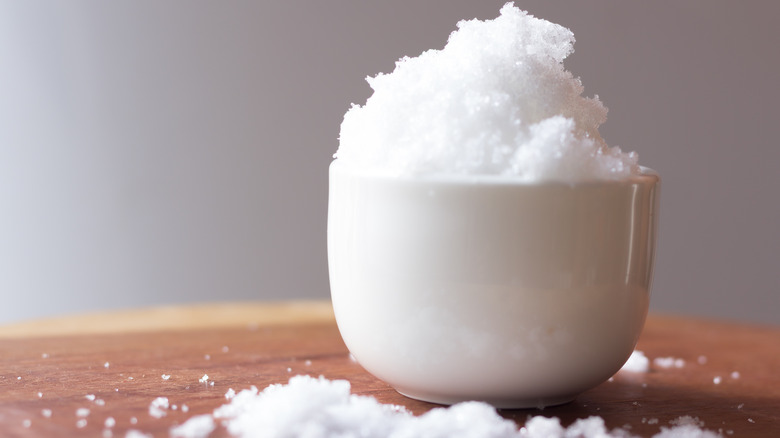Can Epsom Salt Help With Cramps?
You have probably heard that Epsom salt has a plethora of different health benefits. Athletes — including Olympian Laurie Hernandez And Paralympian Jessica Long — tend to swear by it, using the product to ease muscle soreness (via AP News). Perhaps it is even a go-to remedy in your household.
Epsom salt, which is also known as magnesium sulfate, is a chemical compound made up of magnesium, sulfur, and oxygen. It is a crystal-like substance that dissolves in water, releasing ions that are thought to be absorbed through the skin (via WebMD). Widely used for muscle soreness, stress relief, and inflammation, it is a product that can be found in almost any store.
As with any remedy passed down from generation to generation, though, many rarely look into the science of why the treatment is used, or if it even truly works at all. Can it really treat muscle cramps and soreness?
Evidence is lacking
When Epsom salt dissolves, it releases magnesium, which is then theoretically absorbed into the skin. According to dermatologist Dendy Egelman in an interview with Byrdie, baths are the best way to use Epsom salt to your benefit. "In a warm bath, our vessels in our skin dilate and allow for enhanced absorption of magnesium salts throughout the skin," she explained. "It is a little known fact that magnesium is much better absorbed transdermally rather than through the GI tract. This is why using magnesium oil (magnesium chloride) in a spray form or magnesium sulfate (Epsom salts) in a bath or soak makes better sense than oral supplementation."
The National Institutes of Health states that magnesium plays a role in many of our body's processes including muscle and nerve function. However, many people are deficient in magnesium. This may potentially lead to muscle cramps."By taking an Epsom salt bath, or by exposing the skin to Epsom salts in a cream, we hope to increase our magnesium levels and reduce muscle soreness," Greg Grosicki, an assistant professor and director of the exercise physiology laboratory at Georgia Southern University, explained to Runner's World.
However, there really isn't much evidence to fully support many of the proposed benefits of Epsom salt, including muscle cramps. "Lack of evidence aside," Grosicki explained, "if a bath (with or without Epsom salt) helps you to relax after a hard workout, that in and of itself may help to expedite recovery because cortisol promotes muscle breakdown."


